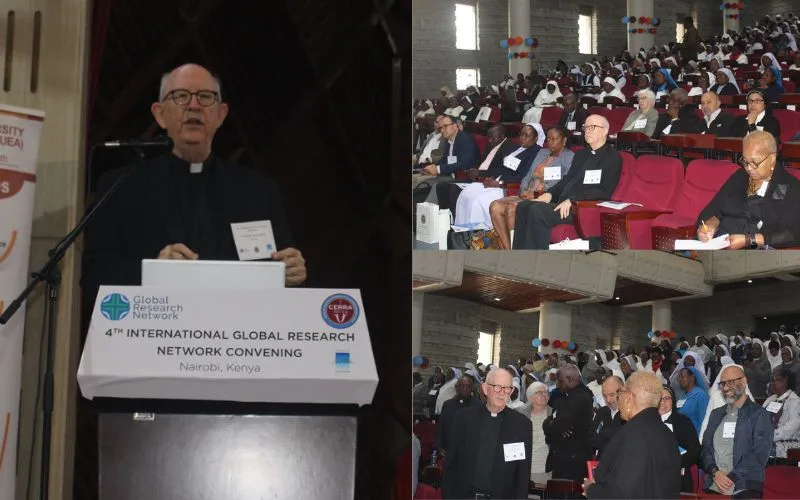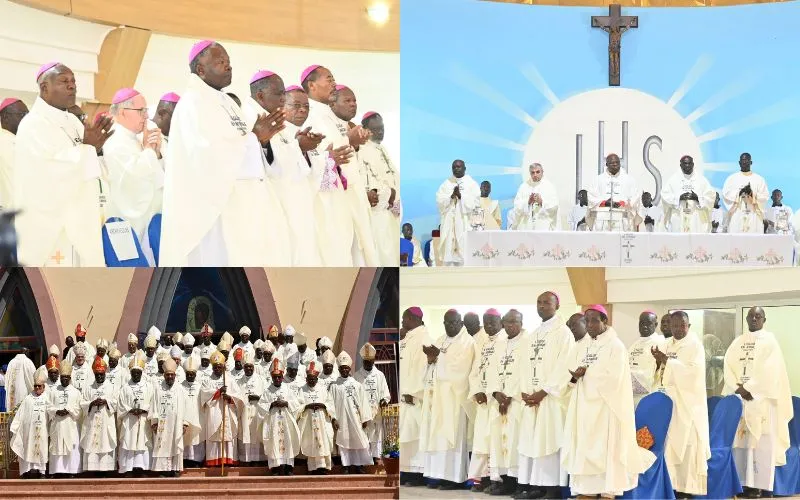Through its studies, the research center which is affiliated with Georgetown University has observed shifts and changes in Religious Life in the U.S., including shrinkages of communities of ICLSAL with some closing down for “completing their missions”, as well as the changing structures within Catholic Sisters’ communities.
“We have identified, particularly in Religious Life, two big issues,” Fr. Tom said in his presentation on June 12 at the research symposium that was held at the main campus of the Kenya-based Catholic University of Eastern Africa (CUEA) in Nairobi. He continued, “One is a generational issue. So, it's the older Religious, like myself, and then with the younger Religious. We have very different experiences, understandings of the Church.”
“In the approximately 35,000 Sisters in the United States, 20,000 of them are aged 75 or older. So, there's only about 15,000 or fewer sisters who are under age 75,” Fr. Tom told ACI Africa.
He added that nearly half of the younger Catholic Sisters currently in the U.S. were born and raised in another country. This group, he said, either came from immigrant families or they are women Religious, who have come to the U.S. as part of their mission with their community.
The situation, CARA Executive Director said, is unique. “The younger, active Sisters, almost half of them are not born in the United States. So, they come with a very different perspective and look at things.”
(Story continues below)
Fr. Tom also disclosed that Religious communities in the U.S. are getting even smaller. “Some of them are coming to completion. They are not accepting new members. The Sisters are going to the Lord. They’ve completed their mission,” he said.
In the June 12 interview with ACI Africa, the CARA official lauded CERRA-Africa for its maiden symposium, noting that participants had had a platform to express the realities of Religious Life in Africa.
“It has been very exciting to see the questions that the Sisters are pursuing more and more. They are very practical. They are focused in terms of “what we need to know” to address the correct realities or to be able to change. Or if we are changing, in what direction are we changing,” Fr. Tom said.
Sharing about his experience of the symposium, the Jesuit Priest, who has served in the formation of Jesuits of the Maryland and New York Provinces said, “I was in a break-out room where a Catholic Sister was exploring the importance of having Philosophy education for the Sisters, and I thought her suggestion was very key, and there were explanations for it.”
“There was also a presentation on the need for Sisters’ Congregations to re-examine their formation policies. And the community that looked at this issue said honestly that they don’t have any policies. They said that things were simply being done quite arbitrarily by the given Sister in charge,” he recalled.
Fr. Tom continued, “The Sisters got into all this sharing because CERRA-Africa provided them with some resources to think about the issues of their Religious Life.”
Also invited to speak at the symposium was the Executive Secretary of the International Union of Superiors General (UISG), Sr. Patricia Murray, on the topic, “Ongoing Formation in Religious Life”.
In her presentation, Sr. Patricia highlighted “interculturality” as “one of the most urgent formation needs today” because of globalization and mobility issues.
“People are moving all over the world, so we're living in much more multicultural context. But multiculturalism means you and I are living side by side, but we kind of don't know one another necessarily,” Sr. Patricia explained to ACI Africa on the sidelines of the research symposium.
“More and more, the Catholic Church sees the need for all of us to become intercultural,” she said.
The Irish-born member of the Institute of the Blessed Virgin Mary (Loreto Sisters) (IBVM/Loreto Sisters), “Becoming intercultural is a theological concept as well as a cultural concept. Theologically it means that you transform me, and I transform you. And that if we're living together in a multicultural group, we actually create a whole new community.”
Pointing out hindrances of interculturality in Religious communities, Sr. Patricia said, “I'm convinced of this, that all of us have innate prejudices that often we don't uncover until we're living in certain situations. Therefore, these kinds of prejudices can rise up very quickly. We see it in populist movements in the world today. Naming people as insiders and others as outsiders.”
“We're all insiders. We're all part of God's family. We're all the people of God,” she emphasized.
The Loreto Sister spoke to ACI Africa on June 12 on a variety of topics, including the service of Catholic Sisters among African migrants and refugees, as well as her life in South Sudan and how the protracted violent conflicts in the world’s youngest nation sadden her.
Previously, Sr. Patricia served as the executive director of Solidarity with South Sudan (SSS), which established a new missionary paradigm of Religious Life with members of ICLSAL living and working together to help the South Sudanese build a peaceful and just society.
Sr. Patricia spoke at length about Talitha Kum Africa, a regional network of ICLSAL, Clergy and individuals who are working to combat human trafficking.
She said that the work of Talitha Kum is especially key in Africa, a continent she said has the greatest mobility in the world.
“There's more mobility in Africa than in any other country. And we see within the Catholic Church the need to create networks, particularly networks to help those who are on the margins of life. And I'm particularly looking at people who are trafficked or those who are migrants or refugees. This is a challenge to the whole church and particularly in Africa,” Sr. Patricia said.
She said that in Africa, people move from rural to urban areas, and from one country to the other in places that she said “are perceived to be more wealthy.”
“Now, in a way, migration is easier, because of air transport, because the world has grown smaller, because we know about one another, because of all sorts of media,” she said and added, “I've seen so many young Africans arriving in Italy where I live.”
Sr. Patricia shared with ACI several accounts of young people from Africa she had encountered in Italy, who were struggling to make ends meet. “These people often are not telling you the truth of what actually life in Europe is like,” she noted.
The UISG Executive Secretary confirmed that “life in Europe is very different – very difficult for migrants into the continent of Europe. Why? Because you need qualifications. You need papers. You need certification. And often there are regulations within countries where you can't work. You can't take up legal work. So, if you're working on the black market, and your employer doesn't pay you, you can't complain anywhere.”
Explaining the work of Talitha Kum in the aid of migrants and refugees, Sr. Patricia said, “We are setting up networks of Sisters working in countries of origin and countries of arrival… We are not only getting them back to Africa but putting them in touch with the Talitha Kum network in Africa so that the network can support them through rehabilitation. They give them some psychological support and help them set up small income generating activities.”
She also spoke about Youth Ambassadors for Talitha Kum, a newly created network to navigate life free from traps of human trafficking.
Agnes Aineah is a Kenyan journalist with a background in digital and newspaper reporting. She holds a Master of Arts in Digital Journalism from the Aga Khan University, Graduate School of Media and Communications and a Bachelor's Degree in Linguistics, Media and Communications from Kenya's Moi University. Agnes currently serves as a journalist for ACI Africa.








